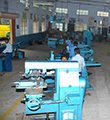
A Diploma in Production Engineering is a technical program focused on the principles and practices of manufacturing and production processes. Typically spanning three years, this diploma provides students with a robust foundation in areas such as manufacturing technology, industrial engineering, quality control, and production management. This overview outlines the core subjects, practical components, and career opportunities associated with the program.
Students are typically required to undertake project work that involves designing, analyzing, and optimizing production systems or processes. Projects may include developing new manufacturing techniques, improving production workflows, or implementing quality control systems.
Many programs incorporate an industrial training or internship component, allowing students to gain hands-on experience in the production engineering field. This exposure is crucial for understanding the practical aspects of production engineering and management.
Depending on the program, students may have the option to choose elective subjects to specialize in specific areas such as: Lean Manufacturing, Supply Chain Management, Advanced Manufacturing Technologies or Energy Management in Production.
Plan, coordinate, and oversee manufacturing processes to ensure efficient and effective production.
Develop and implement quality control systems to ensure products meet specified standards.
Optimize industrial operations and systems for better efficiency and performance.
Ensure the proper functioning and maintenance of production equipment and facilities.
Design and manage the tools and dies used in manufacturing processes.
Oversee and manage production teams and operations on the shop floor.
Plan and manage overall production operations to meet business objectives.
Analyze and improve supply chain processes to enhance efficiency and reduce costs.
Implement and manage automation technologies in manufacturing environments.
Identify and implement opportunities for improving production processes and systems.
Provide technical expertise in the sale and support of manufacturing and production equipment.
Graduates may choose to pursue further education, such as a Bachelor’s degree in Production Engineering, Industrial Engineering, or related fields, to enhance their knowledge and career prospects.
With a strong foundation in production engineering, graduates can also explore opportunities to start their own businesses in areas such as manufacturing consulting, custom production solutions, or developing innovative manufacturing technologies.
 About Course
About Course
 Course Details
Course Details
 Laboratory Work
Laboratory Work
 Project Work
Project Work
 Industrial Training
Industrial Training
 Elective Subjects
Elective Subjects
 Career Opportunities
Career Opportunities








